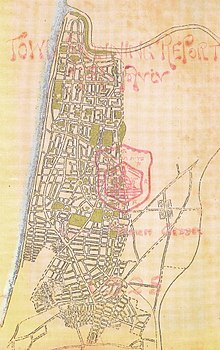
Back باتريك جيدس Arabic باتريك جيدس ARZ Patrik Geddes Azerbaijani پاتریک قدس AZB Patrick Geddes Czech Patrick Geddes Welsh Patrick Geddes Danish Patrick Geddes German Patrick Geddes Esperanto Patrick Geddes Spanish
Sir Patrick Geddes | |
|---|---|
 Geddes in 1886 | |
| Born | 2 October 1854 Ballater, Aberdeenshire, Scotland |
| Died | 17 April 1932 (aged 77) Scots College, Montpellier, France |
| Alma mater | Royal School of Mines |
| Known for | Urban planning and the term conurbation |
| Spouse | Anna Geddes |
| Children | Norah Geddes |
| Scientific career | |
| Fields | Sociology, urban planning, biology |
| Institutions | Lecturer in Zoology, University of Edinburgh (1880–1888) Professor of Botany, University College, Dundee (1888–1919) Professor of Civics & Sociology, Bombay University, India (1920–1923) |
| Patrons | John Sinclair, 1st Baron Pentland |
| Signature | |
 | |
| Notes | |
Fellow of the Royal Society of Edinburgh (1880) Co-founder of the University of Bombay[1] Co-founder of the Sociological Society[1] Founder of the Edinburgh Social Union[1] Founder of the Franco-Scottish Society[1] Planned the Hebrew University at Jerusalem[1] Founder of the Collège des Écossais in Montpellier (1924) | |


Sir Patrick Geddes FRSE (2 October 1854 – 17 April 1932) was a Scottish biologist,[2] sociologist, Comtean positivist, geographer, philanthropist and pioneering town planner. He is known for his innovative thinking in the fields of urban planning and sociology. His works contain one the earliest examples of the 'think globally, act locally' concept in social science.[3]
Following the philosophies of Auguste Comte and Frederic LePlay, he introduced the concept of "region" to architecture and planning and coined the term "conurbation".[4][5][6][7] Later, he elaborated "neotechnics" as the way of remaking a world apart from over-commercialization and money dominance.[8]
An energetic Francophile,[9] Geddes was the founder in 1924 of the Collège des Écossais (Scots College), an international teaching establishment in Montpellier, France, and in the 1920s he bought the Château d'Assas to set up a centre for urban studies.
- ^ a b c d e Macdonald, Murdo (20 May 2009). "Sir Patrick Geddes and the Scottish Generalist Tradition". Royal Society of Edinburgh. Retrieved 13 February 2021.
- ^ "Geddes, Patrick". Who's Who. Vol. 59. 1907. p. 666. Geddes wrote many unsigned articles on biology for the Encyclopædia Britannica and also Chambers's Encyclopaedia.
- ^ Geddes, Patrick (1915). Cities in Evolution. London: Williams. p. 397.
- ^ "UCL Centre for Advanced Spatial Analysis - CASA News: PATRICK GEDDES AND THE DIGITAL AGE". 8 July 2007. Archived from the original on 8 July 2007. Retrieved 8 December 2021.
- ^ Mary., Pickering (2009). Auguste Comte: Volume 3.; An Intellectual Biography. Cambridge University Press. p. 571. ISBN 978-0-521-11914-6. OCLC 710898330.
- ^ R., Wright, T. (2008). The religion of humanity : the impact of Comtean positivism on Victorian Britain. Cambridge University Press. pp. 260–8. ISBN 978-0-521-07897-9. OCLC 488975315.
{{cite book}}: CS1 maint: multiple names: authors list (link) - ^ Wilson, Matthew (11 May 2018). Moralising Space. New York, NY : Routledge, 2018. | Series: Routledge research in planning and urban design: Routledge. pp. 151–80. doi:10.4324/9781315449128. ISBN 978-1-315-44912-8.
{{cite book}}: CS1 maint: location (link) - ^ Caves, R. W. (2004). Encyclopedia of the City. Routledge. p. 287.
- ^ King, Emilie Boyer (5 July 2004). "Anniversary makeover for Geddes garden". The Scotsman. Edinburgh. Retrieved 6 February 2011.
© MMXXIII Rich X Search. We shall prevail. All rights reserved. Rich X Search